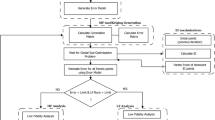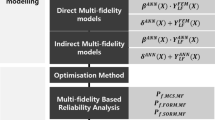Abstract
This work presents an efficient methodology for the optimum design of functionally graded structures using a Kriging-based approach. The method combines an adaptive Kriging framework with a hybrid particle swarm optimization (PSO) algorithm to improve the computational efficiency of the optimization process. In this approach, the surrogate model is used to replace the high-fidelity structural responses obtained by a NURBS-based isogeometric analysis. In addition, the impact of key factors on surrogate modelling, as the correlation function, the infill criterion used to update the surrogate model, and the constraint handling is assessed for accuracy, efficiency, and robustness. The design variables are related to the volume fraction distribution and the thickness. Displacement, fundamental frequency, buckling load, mass, and ceramic volume fraction are used as objective functions or constraints. The effectiveness and accuracy of the proposed algorithm are illustrated through a set of numerical examples. Results show a significant reduction in the computational effort over the conventional approach.















Similar content being viewed by others
References
Amouzgar K, Strömberg N (2017) Radial basis functions as surrogate models with a priori bias in comparison with a posteriori bias. Struct Multidiscip Optim 55(4):1453–1469. https://doi.org/10.1007/s00158-016-1569-0
Arora JS (2012) Introduction to optimum design, 2nd edn. Elsevier Academic Press, Iowa
Asgari M (2016) Material optimization of functionally graded heterogeneous cylinder for wave propagation. J Compos Mater 50(25):3525–3538. https://doi.org/10.1177/0021998315622051
Ashjari M, Khoshravan M (2014) Mass optimization of functionally graded plate for mechanical loading in the presence of deflection and stress constraints. Compos Struct 110:118–132. https://doi.org/10.1016/j.compstruct.2013.11.025
Auad SP, Praciano JSC, Barroso ES, Sousa JBM, Parente E (2019) Isogeometric analysis of FGM plates. Materials Today: Proceedings 8:738–746. https://doi.org/10.1016/j.matpr.2019.02.015
Bachoc F (2013) Cross validation and maximum likelihood estimations of hyper-parameters of Gaussian processes with model misspecification. Computational Statistics and Data Analysis 66(0):55–69. https://doi.org/10.1016/j.csda.2013.03.016, 1301.4320
Bao G, Wang L (1995) Multiple cracking in functionally graded ceramic/metal coatings. Int J Solids Struct 32(19):2853–2871. https://doi.org/10.1016/0020-7683(94)00267-Z
Barroso ES, Parente E, Cartaxo de Melo AM (2017) A hybrid PSO-GA algorithm for optimization of laminated composites. Struct Multidiscip Optim 55(6):2111–2130. https://doi.org/10.1007/s00158-016-1631-y
Bratton D, Kennedy J (2007) Defining a standard for particle swarm optimization. 2007 IEEE Swarm Intelligence Symposium. https://doi.org/10.1109/SIS.2007.368035
Cheng J, Liu Z, Wu Z, Li X, Tan J (2014) Robust optimization of structural dynamic characteristics based on adaptive kriging model and CNSGA. Struct Multidiscip Optim 51(2):423–437. https://doi.org/10.1007/s00158-014-1140-9
Cho I, Lee Y, Ryu D, Choi DH (2017) Comparison study of sampling methods for computer experiments using various performance measures. Structural and Multidisciplinary Optimization 55(1):221–235. https://doi.org/10.1007/s00158-016-1490-6
Chunna L, Hai F, Chunlin G (2020) Development of an efficient global optimization method based on adaptive infilling for structure optimization. Structural and Multidisciplinary Optimization. https://doi.org/10.1007/s00158-020-02716-y
Clerc M (2012) Standard particle swarm optimisation. https://hal.archives-ouvertes.fr/hal-00764996/document
Deb K (2000) An efficient constraint handling method for genetic algorithms. Comput Methods Appl Mech Eng 186(2):311–338. https://doi.org/10.1016/S0045-7825(99)00389-8
Do DT, Lee D, Lee J (2018) Material optimization of functionally graded plates using deep neural network and modified symbiotic organisms search for eigenvalue problems. https://doi.org/10.1016/j.compositesb.2018.09.087, vol 159, pp 300–326
Forrester AIJ, Sobester A, Keane AJ (2008) Engineering design via surrogate modelling: a practical guide. Wiley, Chichester
Franco VM, Madeira JFA, Araújo AL, Mota CM (2018) Multiobjective optimization of ceramic-metal functionally graded plates using a higher order model. Composite Structures 183:146–160. https://doi.org/10.1016/j.compstruct.2017.02.013
Gan N, Gu J (2018) Hybrid meta-model-based design space exploration method for expensive problems. Struct Multidiscip Optim 59(3):907–917. https://doi.org/10.1007/s00158-018-2109-x
Hughes T, Cottrell J, Bazilevs Y (2005) Isogeometric analysis: CAD, finite elements, NURBS, exact geometry and mesh refinement. Comput Methods Appl Mech Eng 194(39):4135–4195. https://doi.org/10.1016/j.cma.2004.10.008
Jones DR, Schonlau M, Welch WJ (1998) Efficient global optimization of expensive black-box functions. J Glob Optim 13:455– 492
Kalagnanam JR, Diwekar UM (1997) An efficient sampling technique for off-line quality control. Technometrics 39(3):308–319
Kennedy J, Eberhart R (1995) Particle swarm optimization. In: Proceedings of ICNN’95 - International Conference on Neural Networks, vol 4, pp 1942–1948
Keshtegar B, Nguyen-Thoi T, Truong TT, Zhu SP (2020) Optimization of buckling load for laminated composite plates using adaptive kriging-improved PSO: a novel hybrid intelligent method. Defence Technology. https://doi.org/10.1016/j.dt.2020.02.020
Khorsand M, Tang Y (2018) Design functionally graded rotating disks under thermoelastic loads : weight optimization. Int J Press Vessel Pip 161(November 2017):33–40. https://doi.org/10.1016/j.ijpvp.2018.02.002
Kianifar MR, Campean F (2019) Performance evaluation of metamodelling methods for engineering problems: towards a practitioner guide. Struct Multidiscip Optim 61(1):159–186. https://doi.org/10.1007/s00158-019-02352-1
Kim KD, Lomboy G, Han SC (2008) Geometrically non-linear analysis of functionally graded material (FGM) plates and shells using a four-node quasi-conforming shell element. Journal of Composite Materials 42:485–511. https://doi.org/10.1177/0021998307086211
Kim N, Huynh T, Lieu QX, Lee J (2018) Nurbs-based optimization of natural frequencies for bidirectional functionally graded beams. https://doi.org/10.24423/AOM.2897
Koizumi M (1997) FGM activities in Japan. Composites Part B: Engineering 28(1):1–4. https://doi.org/10.1016/S1359-8368(96)00016-9
Kou X, Parks G, Tan S (2012) Optimal design of functionally graded materials using a procedural model and particle swarm optimization. Comput Aided Des 44(4):300–310. https://doi.org/10.1016/j.cad.2011.10.007
Lieu QX, Lee J (2019a) An isogeometric multimesh design approach for size and shape optimization of multidirectional functionally graded plates. Computer Methods in Applied Mechanics and Engineering 343:407–437. https://doi.org/10.1016/j.cma.2018.08.017
Lieu QX, Lee J (2019b) A reliability-based optimization approach for material and thickness composition of multidirectional functionally graded plates. Composites Part B: Engineering 164:599–611 . https://doi.org/10.1016/j.compositesb.2019.01.089
Lieu QX, Lee J, Lee D, Lee S, Kim D, Lee J (2018) Shape and size optimization of functionally graded sandwich plates using isogeometric analysis and adaptive hybrid evolutionary firefly algorithm. Thin-Walled Structures 124:588–604. https://doi.org/10.1016/j.tws.2017.11.054
Liu H, Ong Y, Cai J (2017) A survey of adaptive sampling for global metamodeling in support of simulation-based complex engineering design. Structural and Multidisciplinary Optimization. https://doi.org/10.1007/s00158-017-1739-8
Liu Z, Xu H, Zhu P (2020) An adaptive multi-fidelity approach for design optimization of mesostructure-structure systems. Struct Multidiscip Optim 62:375–386. https://doi.org/10.1007/s00158-020-02501-x
Locatelli M (1997) Bayesian algorithms for one-dimensional global optimization. Journal of Global Optimization 10(1):57–76. https://doi.org/10.1023/A:1008294716304
Martin JD, Simpson TW (2005) Use of kriging models to approximate deterministic computer models. AIAA Journal 43(4):853–863. https://doi.org/10.2514/1.8650
Mockus J, Tiesis V, Zilinskas A (1978) The application of Bayesian methods for seeking the extremum, vol 2. North-Holland Publishing Company, pp 117–129
Moita JS, Araújo AL, Franco V, Mota CM (2017) Material distribution and sizing optimization of functionally graded plate-shell structures. Composites Part B 142:263–272. https://doi.org/10.1016/j.compositesb.2018.01.023
Morris MD, Mitchell TJ (1995) Exploratory designs for computational experiments. Journal of Statistical Planning and Inference 43(3):381–402. https://doi.org/10.1016/0378-3758(94)00035-T
Na KS, Kim JH (2009) Optimization of volume fractions for functionally graded panels considering stress and critical temperature. Compos Struct 89(4):509–516. https://doi.org/10.1016/j.compstruct.2008.11.003
Nguyen TT, Lee J (2017) Optimal design of thin-walled functionally graded beams for buckling problems. Compos Struct 179:459–467. https://doi.org/10.1016/j.compstruct.2017.07.024
Nikbakht S, Kamarian S, Shakeri M (2019) A review on optimization of composite structures part II: functionally graded materials. Composite Structures 214(January):83–102 . https://doi.org/10.1016/j.compstruct.2019.01.105
Nikbakt S, Kamarian S, Shakeri M (2018) A review on optimization of composite structures part I: laminated composites. Compos Struct 195:158–185. https://doi.org/10.1016/j.compstruct.2018.03.063
Omkar S, Senthilnath J (2011) Artificial Bee Colony (ABC) for multi-objective design optimization of composite structures. Appl Soft Comput 11(1):489–499. https://doi.org/10.1016/j.asoc.2009.12.008
Palar PS, Shimoyama K (2018) Efficient global optimization with ensemble and selection of kernel functions for engineering design. Struct Multidiscip Optim 59(1):93–116. https://doi.org/10.1007/s00158-018-2053-9
Passos AG, Luersen MA (2017) Multiobjective optimization of laminated composite parts with curvilinear fibers using kriging-based approaches. Struct Multidiscip Optim 57(3):1115–1127. https://doi.org/10.1007/s00158-017-1800-7
Piegl L, Tiller W (1997) The NURBS book, 2nd edn. Springer, Berlin
Praciano JSC, Barros PSB, Barroso ES, Parente E, Holanda AS, Sousa JBM (2019) An isogeometric formulation for stability analysis of laminated plates and shallow shells. Thin-Walled Struct 143:106224. https://doi.org/10.1016/j.tws.2019.106224
Ribeiro LG, Maia MA, Parente Jr E, de Melo AMC (2020) Surrogate based optimization of functionally graded plates using radial basis functions. Compos Struct 252:112677. https://doi.org/10.1016/j.compstruct.2020.112677
Rocha IBCM, Parente E Jr, Melo AMC (2014) A hybrid shared/distributed memory parallel genetic algorithm for optimization of laminate composites. Composite Structures 107(1):288–297. https://doi.org/10.1016/j.compstruct.2013.07.049
Sacks J, Welch WJ, Mitchell TJ, Wynn HP (1989) Design and analysis of computer experiments. Stat Sci 4(4):409–435
Schonlau M, Welch W, Jones D (1998) Global versus local search in constrained optimization of computer models, vol 34. Institute of Mathematical Statistics, pp 11–25. https://doi.org/10.1214/lnms/1215456182
Shen HS (2009) Functionally graded materials: nonlinear analysis of plates and shells. CRC Press
Shi P, Dong C, Sun F, Liu W, Hu Q (2018) A new higher order shear deformation theory for static, vibration and buckling responses of laminated plates with the isogeometric analysis. Composite Structures 204(June):342–358. https://doi.org/10.1016/j.compstruct.2018.07.080
Sóbester A, Leary SJ, Keane AJ (2005) On the design of optimization strategies based on global response surface approximation models. Journal of Global Optimization 33(1):31–59. https://doi.org/10.1007/s10898-004-6733-1
Steponavic~e I, Shirazi-Manesh M, Hyndman RJ, Smith-Miles K, Villanova L (2016) On sampling methods for costly multi-objective black-box optimization. In: Advances in stochastic and deterministic global optimization. https://doi.org/10.1007/978-3-319-29975-4_15. Springer International Publishing, pp 273–296
Sun G, Xu F, Li G, Li Q (2014) Crashing analysis and multiobjective optimization for thin-walled structures with functionally graded thickness. International Journal of Impact Engineering 64:62–74. https://doi.org/10.1016/j.ijimpeng.2013.10.004
Taheri A, Hassani B, Moghaddam N (2014) Thermo-elastic optimization of material distribution of functionally graded structures by an isogeometrical approach. International Journal of Solids and Structures 51 (2):416–429. https://doi.org/10.1016/j.ijsolstr.2013.10.014
Touloukian YS (1967) Thermophysical properties of high temperature solid materials. MacMillan, New York
Tutum CC, Deb K, Baran I (2015) Constrained efficient global optimization for pultrusion process. Mater Manuf Process 30(4):538–551. https://doi.org/10.1080/10426914.2014.994752
Vel SS, Pelletier JL (2006) Multi-objective optimization of functionally graded thick shells for thermal loading. Compos Struct 81:386–400. https://doi.org/10.1016/j.compstruct.2006.08.027
Wang C, Yu T, Curiel-Sosa JL, Xie N, Bui TQ (2019) Adaptive chaotic particle swarm algorithm for isogeometric multi-objective size optimization of FG plates. Structural and Multidisciplinary Optimization 60(2):757–778. https://doi.org/10.1007/s00158-019-02238-2
Wang L, Chan YC, Ahmed F, Liu Z, Zhu P, Chen W (2020) Deep generative modeling for mechanistic-based learning and design of metamaterial systems. Computer Methods in Applied Mechanics and Engineering 372:113377. https://doi.org/10.1016/j.cma.2020.113377
Xing J, Luo Y, Gao Z (2020) A global optimization strategy based on the kriging surrogate model and parallel computing. Struct Multidiscip Optim 62(1):405–417. https://doi.org/10.1007/s00158-020-02495-6
Zhan D, Xing H (2020) Expected improvement for expensive optimization: a review. Journal of Global Optimization. https://doi.org/10.1007/s10898-020-00923-x
Zhang Y, Gao L, Xiao M (2020) Maximizing natural frequencies of inhomogeneous cellular structures by kriging-assisted multiscale topology optimization. Computers & Structures 230:106197. https://doi.org/10.1016/j.compstruc.2019.106197
Zhu WG, Meng ZJ, Huang J, He W (2012) Optimization design for laminated composite structure based on kriging model. In: Advanced materials and process technology, Trans Tech Publications Ltd, Applied Mechanics and Materials. https://doi.org/10.4028/www.scientific.net/AMM.217-219.179, vol 217, pp 179–183
Funding
This study was financed by the Conselho Nacional de Desenvolvimento Científico e Tecnológico (CNPq) and the Fundação Cearense de Apoio ao Desenvolvimento Científico e Tecnológico (FUNCAP). The authors gratefully acknowledge the financial support provided by these agencies.
Author information
Authors and Affiliations
Corresponding author
Ethics declarations
Conflict of interest
The authors declare that they have no conflict of interest.
Additional information
Responsible Editor: Shikui Chen
Author contribution
Marina Alves Maia: software, formal analysis, validation, investigation, data curation, writing — original draft preparation, review and editing, visualization. Evandro Parente Junior: conceptualization, methodology, software, funding acquisition, project administration, writing — review and editing. Antônio Macário Cartaxo de Melo: resources, supervision, writing — review and editing.
Availability of data and material
The datasets generated during this study will be available online at https://doi.org/10.17632/p57m4yxygk.1.
Code availability
The executable files are available online at the referred repository.
Replication of results
In addition to the material available as supplementary material, the authors believe that sufficient details of the proposed approach have been provided in this paper, allowing the replication of the experiments.
Publisher’s note
Springer Nature remains neutral with regard to jurisdictional claims in published maps and institutional affiliations.
Rights and permissions
About this article
Cite this article
Maia, M.A., Parente, E. & de Melo, A. Kriging-based optimization of functionally graded structures. Struct Multidisc Optim 64, 1887–1908 (2021). https://doi.org/10.1007/s00158-021-02949-5
Received:
Revised:
Accepted:
Published:
Issue Date:
DOI: https://doi.org/10.1007/s00158-021-02949-5




